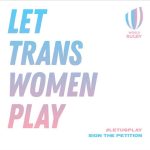Call to ‘let trans women play’ goes out to rugby community
Alliance of UK’s leading LGBT+ sports organisations asks rugby clubs to show support for further research and ‘Rugby For All’ inclusion…
By Jon Holmes

A call to action has been issued to members of the global rugby union community amid new proposals from World Rugby that could result in transgender women being banned from playing women’s rugby.
The LGBTIQ+ Sport and Physical Activity Alliance, which comprises the UK’s three leading LGBT+-inclusive sports organisations – Pride Sports, LEAP Sports Scotland, and LGBT+ Sport Cymru – is using its collective voice to share the ‘Let Trans Women Play’ message, inviting players, officials, administrators and fans from across the game to unite in solidarity on trans inclusion.
The inclusion movement started in mid-July when a draft document outlining the World Rugby trans participation working group’s proposals, which have been sent to individual unions for feedback to be given by August 31, was leaked to The Guardian newspaper.
A Change.org petition titled ‘Keep Rugby Open to Trans Women Athletes’ was then launched in response by Grace McKenzie, who plays for the Golden Gate Women’s club in San Francisco. At the time of writing, the petition has accumulated nearly 17,000 signatures.
International Gay Rugby (IGR) and an Athlete Ally-backed coalition of mostly US-based women’s rugby organisations under the ‘Rugby For All’ banner have also voiced their opposition to the suggestion that the proposed new Guideline – drawn up following a workshop forum of presentations held in February – needs to be introduced.
Among the presentations made at the forum was ‘Effects of testosterone suppression on biology and performance in Transgender Women’ by the Karolinska Institutet’s Dr Tommy Lundberg, which referenced a study titled ‘Muscle Strength, Size, and Composition Following 12 Months of Gender-affirming Treatment in Transgender Individuals’ produced by Lundberg and colleagues. The Transgender Workshop documentation is available to view on the World Rugby website.
The working group considered all the presentations made at the forum before making its recommendations, but a lack of available research meant there were no testimonies heard from trans women rugby players, and data from the studies and presentations was not specific to either trans women athletes or the sport of rugby.
As a result, UK rugby clubs are being invited to sign a pledge in support of “a thorough, peer-reviewed and evidence-based investigation into issues of safety, and allow trans athletes to continue playing the game they love in a safe and welcoming environment”.
LGBT+ Sport Cymru chair Michelle Daltry says: “We are asking rugby clubs at all levels of the game to stand with us against a ruling that is exclusionary and that will impact some of the most vulnerable people in the community.”

The three organisations that make up the LGBTIQ+ Sport and Physical Activity Alliance say they have analysed the World Rugby draft Guideline and are firmly rejecting it on the following grounds…
* it draws upon research that is non-athlete and non-rugby specific and which uses inaccurate modelling to reach its conclusions;
* it presents no evidence of physical performance and ability to play safely of trans women;
* it takes no account of the current situation of transgender rugby players providing no baseline or impact assessment;
* many questions are raised about impartiality and bias of the process and many of its contributors.
LGBTIQ+ Sport and Physical Activity Alliance statement
Their statement continues: “As a result, it is the considered view of the Alliance that the Draft Guideline reaches conclusions which are wholly disproportionate to the evidence it considers, with the blanket exclusion of transgender women being entirely unjustified.”
Stonewall, the UK’s leading LGBT+ equality charity, has also lent its support for the LGBTIQ+ Sport and Physical Activity Alliance’s position, using the hashtag #TackleTransphobia.
Meanwhile, the University of Bath’s Dr Sheree Bekker – a Prize Research Fellow in Injury Prevention, working as a sports injury specialist in the university’s Department of Health – has spoken in support of the Alliance’s stance. She says introducing a policy into women’s rugby that is wholly exclusionary rather than the current inclusive approach would be wrong.
“Any exclusionary policy in women’s sport hurts all women. This policy approach enacts a particular structural violence against trans women,” says Dr Bekker.

“Pitting safety against fairness is a false dichotomy.
“If size discrepancy is the main safety concern (note: this is contested as it appears to be based on comparing cis men and cis women in this case), then we must ask why a blanket ban is the best approach.
“As an injury prevention researcher, we know that preventing injury is more about skill/technique training and conditioning than anything else. Indeed, other approaches to size discrepancies are being taken in rugby elsewhere (e.g. weight-restricted competition).
“Women’s rights and trans rights are not in opposition. Whilst discussion of sex/gender may seem like an issue that is incredibly complex in the binary world of sport, we can and should hold space for a different vision of gender-inclusive sport. Indeed, this already exists in women’s rugby right now.”
IGR has also shared its 230-page document of feedback to World Rugby on the draft Guideline. Verity Smith and Megan Goettsches represented the organisation at the forum in February.

The document’s foreword summarises the IGR position as follows…
“It is the considered opinion of IGR that the conclusions contained in the draft guideline have been developed using deficient modelling that uses a group-level aggregate of an extremely specific sub-set of players to allege an increased risk of injury to cisgendered female players. They are based on research that has:
“a) not yet been peer-reviewed;
“b) rely on an extremely limited body of non-athlete and non-rugby specific research; and,
“c) do not involve any scientific research involving trans women rugby players themselves.
“Compounding the issue, the draft guideline applies arguments related to safety exclusively to certain players only because they are transgender. Cis-gender women with the same alleged % safety risk to other athletes would continue to play. Cisgender men playing with the same alleged % safety risk to their own bodies would continue to play with no additional barriers. It demonstrates, on its face, a fundamental lack of understanding of our core values and of how the game of rugby is played, by all athletes, of all ages, at all levels of the game, all across the world.
“This is direct and active discrimination against transgender athletes.”
IGR has made more trans and non-binary inclusion resources available on its website here.
As well as issuing calls to sign the UK club pledge and the Change.org petition, the LGBTIQ+ Sport & Physical Activity Alliance is also requesting visitors to its website to submit their stories of inclusive rugby, and to use social media to amplify the hashtags #TackleTransphobia, #LetUsPlay and #RugbyForAll.
Links
Let Trans Women Play: Four ways you can show your support, LGBTIQ+ Sport & Physical Activity Alliance
Change.org Petition: ‘Keep Rugby Open to Trans Women Athletes’
IGR feedback on World Rugby draft Guideline
‘Trans women face potential women’s rugby ban over safety concerns’, The Guardian, 19 July 2020
World Rugby: Transgender Workshop 2020 documentation
Sports Media LGBT+ is a network, advocacy and consultancy group that is helping to build a community of LGBT+ people and allies in sport. Learn more about us on our About page; to get in touch, Contact Us here.


